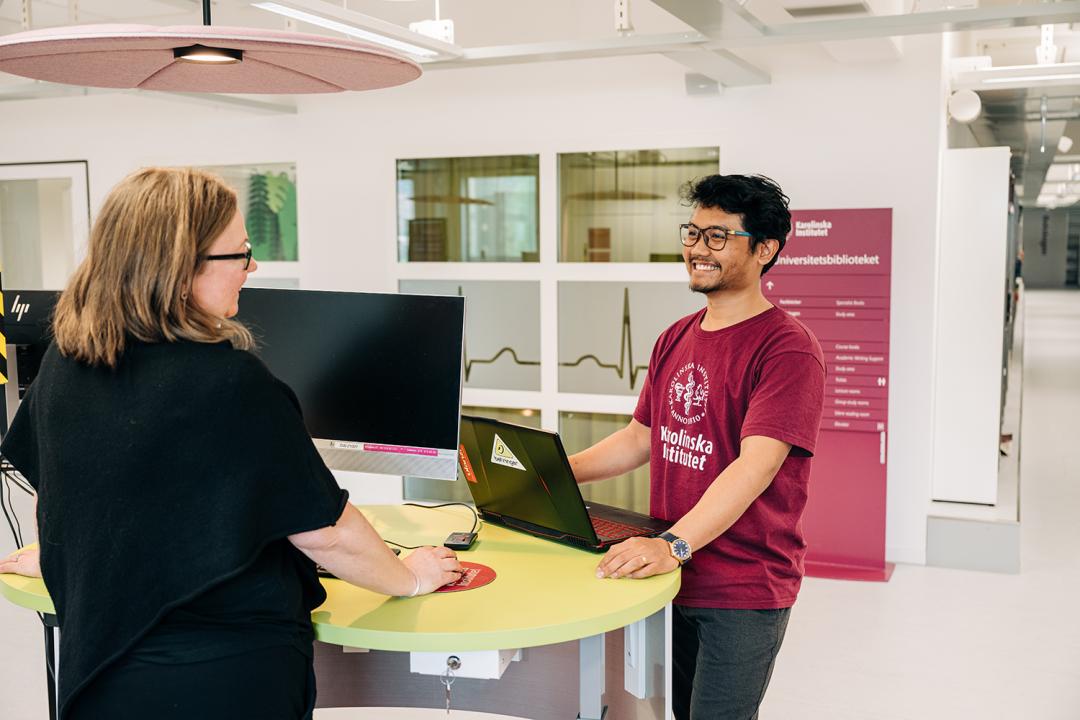Our activities
At KIB, we are specialists in information management. We know how to effectively search for and find relevant information in the field of medicine. We also know how to store information and make it accessible so that others can find it, use it, or build upon it. Using this expertise, we support KI’s students, researchers, and teachers throughout all stages of education and the research process. KIB is also responsible for preserving, developing, and sharing knowledge about KI’s medical and scientific heritage, as well as managing and providing access to KI’s cultural heritage collections.
Equal opportunities
Karolinska Institutet's activities must be characterised by participation, openness, gender equality and diversity. At the library, we work actively to ensure that our services can be used by all equally.
KIB has a zero tolerance policy regarding discrimination, sexism and racism. All library visitors and staff must be treated with respect.
Read more about the library's work with equal opportunity
Environment and sustainability
In line with KI's sustainability goals, KIB works actively to reduce the library's negative environmental impact.
The aim is to integrate sustainability into all work that occurs in the library.
Read more at the page Sustainable development
Publications
At the library, we are happy to share what we do at work. Below is a list of articles that reflect KIBs activities and the interests of its librarians.
Transformative agreements and their practical impact: a librarian perspective S. Parmhed, J. Säll. Insights. 2023:36 (12): 1-7
The library as a physical learning environment at the Karolinska Institutet University Library C. Ahlberg. JEAHIL. 24Jun.2020;16(2):24-8.
Cancelling with the world’s largest scholarly publisher: lessons from the Swedish experience of having no access to Elsevier. L. Olsson, C. Hertil Lindelöw, L. Österlund, F. Jakobsson. Insights. 2020:33 (1): 13.
Using a social platform as an internal communication tool: A case study. Haya G, Lind SM, Janzen S. College & Research Libraries News (C&RL News). 2020;81(1):14–17.
Granularity of Algorithmically Constructed Publication-Level Classifications of Research Publications: Identification of Specialties. Sjögårde P, Ahlgren P. Quantitative Science Studies, 29 August 2019, 1–32.
Granularity of algorithmically constructed publication-level classifications of research publications: Identification of topics. Sjögårde P, Ahlgren P. Journal of Informetrics. 2017;12(1):133-152.
Why doesn’t everyone love reading e-books?. Myrberg C. Insights. 2017;30(3):115–125.
Letter to the Editor: Are older studies lost in database searches for systematic reviews? Jonsson BH, Winzer R, Gornitzki C. Psychological Medicine. 2017 Nov 27:1–2.
Abandoning native apps to become future friendly. Jergefelt M. Journal of the European Association for Health Information and Libraries. 2015;11(2):36–38.
An internet of pings: enhancing the web user experience of physically present patrons with bluetooth beacons. Jergefelt M. Weave: Journal of Library User Experience. 2015;1(2).
Bringing the national interlending system into the local document supply process – a Swedish case study. Gavel Y. Interlending and Document Supply. 2015;43(2):104–109.
Freewheelin’ scientists: citing Bob Dylan in the biomedical literature. Gornitzki C, Larsson A, Fadeel B. BMJ. 2015;351:h6505.
Screen vs. paper: what is the difference for reading and learning?. Myrberg C, Wiberg N. Insights. 2015;28(2):49–54.
A visit to the library of the Italian Institute of Health in Rome (ISS, Istituto Superiore di Sanità). Carlsson J. Journal of the European Association for Health Information and Libraries. 2014;10(3):21–22.
MOOCs at KI University Library. Ahlberg C. Insights. 2014;27.
Multilingual query expansion in the SveMed+ bibliographic database: a case study. Gavel Y, Andersson P-O. Journal of Information Science. 2014;40(3):269–280.

Contact the library
You are welcome to contact us through phone, chat or email.
Opening hours chat & phone
If you would like us to get back to you, please submit your contact information in the form below along with your feeback.
